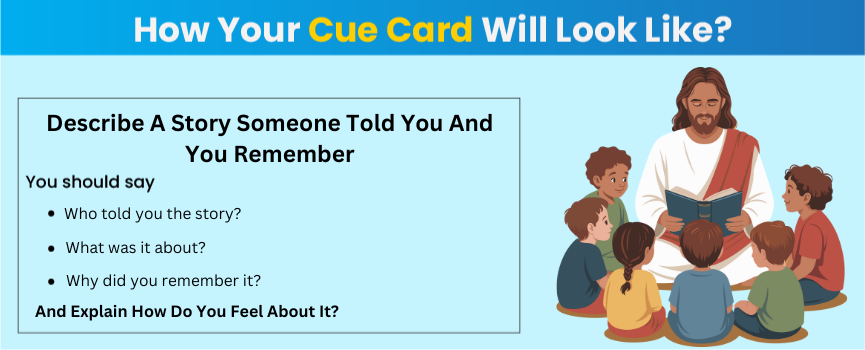Describe A Story Someone Told You And You Remember - IELTS Cue Card
Last updated: Oct 27, 2025Ready to charm the examiner with a compelling tale? The IELTS Speaking cue card asks you to speak for two minutes on a given topic, assessing your fluency, grammar and ability to organise thoughts quickly. This particular topic, “Describe a story someone told you and you remember,” is a great chance to share a personal experience. Read the blog for a sample response to perfect your answers.

Table of Contents
Introduction to IELTS Cue Cards
The second task of the IELTS speaking section contains a “cue card” or “candidate task card”, which presents a topic you must talk about for up to two minutes. You also get one minute to think and make notes. This part of the IELTS checks if you can speak clearly about something specific, organise your thoughts, and use decent vocabulary. For example, if the cue card asks you to “describe a story someone told you and you remember”, you just need to tell that story, saying what it was about, who told it, and why you still remember it.
How to Answer the IELTS Cue Card?
So, to ace the IELTS speaking part 2 on a topic “Describe a story someone told you and you remember”, you should tell a personal story about a memorable narrative you heard.
Start by introducing the storyteller; maybe it was your grandma, grandpa, your mom or dad, a teacher, or a friend, and then explain when & where they told it.
Next, get into the details of the story itself. What was it all about? Who were the main characters, or what was the big event? Try to tell it like you are reliving the amount, hearing it for the first time.

 Access speaking Mock Test
Access speaking Mock Test Don't forget to say why the story stayed with you. Did it have a strong lesson? Was there a crazy twist? Or did it just make you feel something big? End it by saying how you feel about the story now and how it's changed you. If you follow the structure mentioned below, you will provide a complete and compelling answer.
- Who told you the story?
- What was it about?
- Why did you remember it? And how do you feel about it?
Refer to the image below for an example of what your IELTS Speaking Part 2 cue card may resemble.

Describe A Story Someone Told You And You Remember - Sample 1
Here’s the first sample response of “describe a story someone told you and you remember” that could help you get a good band score in this round.
Who Told You the Story?
I heard many amazing and memorable stories. However, one particular story my friend’s grandmother told during my high school years stands out. Back then, when I was 16 years old, her grandmother shared a story, Sita and Geeta, one of the oldest and most traditional tales of India.
What Was It About?
The story is about a family with two stepsisters who are very different. One, Sita, was nice, hardworking, and modest, but the other, Gita, was greedy, lazy, and selfish. The mom treated Gita better and was awful to Sita. She made her do all the chores and then sent her away into the forest. Sita came across a little house where an old woman lived. Even though she was super hungry and worn out, Sita helped the woman out by cleaning up and sharing her food. Turns out, the old woman was a magician. She was so touched by how nice Sita was that she gave her a basket of gold. When Sita got home, her stepmom and Gita were totally shocked and wanted to know where the gold came from. After hearing the story, Gita went to the forest herself, but she was a brat and really demanding, treating the old woman badly. So, instead of getting a reward, Gita got a curse, and bad luck followed her everywhere.
Why Do I Remember It? And How I Feel About It?
The story taught me that being kind and humble always leads to good things, but being greedy and having a bad attitude leads to bad things. My friend's grandma told the story so well that I can still remember every part of it.


Describe A Story Someone Told You And You Remember - Sample 2
Check out this second sample response of “Describe A Story Someone Told You And You Remember” designed to help you achieve that 8+ band score.
Who Told You the Story?
When I was a child, my mother used to tell me different stories, and one of the most memorable ones was the story of “The Ant and the Grasshopper”.
What Was It About?
It is a classic Aesop's fable, in which a grasshopper spends the summer singing and playing while a diligent ant works hard to store food for winter. When winter arrives, the grasshopper asks the ant for help, but the ant refuses, explaining that it is not he ant’s fault the grasshopper chose to be idle instead of preparing for the future.
Why Did You Remember It? And How Do You Feel About It?
I first heard this story when I was about seven. Mom told me before bed. Usually, she read to me, but this time, she told a story from memory. I was really into it, especially because it had such a clear lesson. Mom really brought it to life. She used different voices for the ant and the grasshopper, which made it super interesting. I think that's why I still remember it after all these years.
I still remember it because the message about working hard and planning for the future is a classic. Even now, I appreciate the lessons, and I think it's a great example of how fables can teach kids about values.

Describe A Story Someone Told You And You Remember - Sample 3
Here’s a third sample that can guide you toward that 8+ band score as well.
Who Told You the Story?
I don’t usually find stories interesting. They kind of bore me. You have to sit still and listen to someone talk for a long time, which can get tedious. But I heard one story recently from my grandpa, and I liked it. It was about when our country became independent. My grandpa told it to my cousins and me. He was only 20 when it happened.
What Was It About?
Back then, the people who fought valiantly for our freedom were super brave. The British punished notable figures like Shahid Bhagat Singh and Sardar Kartar Singh Sarabha because they worked so hard to get us free. My grandpa also talked about what happened after India and Pakistan's partition. He said trains came from Pakistan full of dead Hindus' bodies who had been killed by Muslims. Then, trains went back to Pakistan from India with Muslims who had been killed by Hindus. He said it was a terrible thing to see, with blood all over the place. All the fighting and hate led to the split, with Pakistan becoming a country for Muslims and India a country for Indians. Sadly, Hindus and Muslims still don't always get along now.
Why Do I Remember It? And How Do I Feel About It?
The story made me want to do something good for my country, like the people who fought for our freedom. It’s the only story that I've ever really liked. I listened to my grandpa tell it all in one go.
These three examples are tailored for the cue card topic “Describe A Story Someone Told You and You Remember.” Next up, we’ll dive into some helpful vocabulary used in these samples.

Lexical Resources
The samples provided contain advanced vocabulary that can enhance your responses in the cue cards of the IELTS speaking section. This section presents a table of challenging words used in the previous samples along with their meanings, helping you to expand and refine your vocabulary as you prepare for the IELTS exam.
| Words | Meaning |
|---|---|
| Traditional Tales | Traditional tales are stories, often originating from oral tradition, that have been passed down through generations and are well-known within a culture |
| Modest | Unassuming or moderate in the estimation of one's abilities or achievements. |
| Chores | A routine task, especially a household one. |
| Curse | A coarse or blasphemous word or phrase used to express anger or other strong emotion. |
| Grasshopper | A plant-eating insect with long hind legs that are used for jumping and for producing a chirping sound. It frequents grassy places and low vegetation. |
| Aesop's | Primarily refers to the ancient greek storyteller famous for a collection of fables that convey moral lessons, often through animal characters |
| Diligent | Having or showing care and conscientiousness in one's work or duties. |
| Appreciate | Recognize the full worth of. |
| Fable | A short story, typically with animals as characters, conveying a moral. |
| Tedious | Too long, slow, or dull; tiresome or monotonous. |
| Valiantly | With courage or determination. |
| Notable Figures | Individuals who are important, famous, or remarkable enough to be worthy of notice |
| Partition | Divide into parts. |
| Terrible | Extremely or distressingly bad or serious. |
The vocabulary for IELTS introduced in the above-mentioned table will be beneficial for your cue card responses. The following section will also address potential follow-up questions that may arise in IELTS Speaking Part 3.
Follow-up Questions
For the third task of the IELTS speaking section, the test limit is 4 to 5 minutes. It is important to provide detailed answers along with examples and personal experience. Below, we have provided some follow-up questions with answers related to the topic “describe a story someone told you and you remember”. Here are some possible questions:
1. What Stories Do Kids Like?
Kids these days are into all sorts of stories. They like old-school fairytales with lessons, but also modern stories about fun, magic, and pals. They usually go for stories with characters they understand, wild scenes, and plots that keep them guessing. Lots of kids love stories about animals, heroes, or cool mythical creatures like dragons and unicorns.
2. Is Storytelling Important?
Absolutely, Storytelling is super important. It is a fundamental part of human communication and culture. It teaches right from wrong, passes down traditions, and keeps history alive. Stories help us see things from different angles, understand stuff, and bond with peeps.
3. Has Storytelling Changed Over Time?
Storytelling has developed significantly over time. It has moved from purely oral traditions to written formats like books and plays, and more recently to digital formats like movies, YouTube videos, television and podcasts. Tech has completely changed how stories are created, shared and consumed. While the essence of a good story remains the same, the method of delivery and the tools used to share them have changed dramatically.
4. Do You Think Older People Like to Tell Stories?
Yes, many old people love telling their grandchildren stories. They have tons of memories and experiences, and storytelling is a way to share what they know with younger family members. It's also a chance for them to remember good times and hang out with family and friends.
Overall, these are the follow-up questions along with answers for your cue card topic “describe a story someone told you and you remember.” The next section will give you useful tips on how to excel in the IELTS cue cards task.
Tips to Excel in the IELTS Cue Card
To achieve a good score in the IELTS speaking part 2, you should keep some things in mind. Below you will find some tips to achieve a good band score:
- Take a few seconds to understand and read the subject, instruction and question provided on the cue card.
- Use the one-minute preparation time wisely to prepare your thoughts and structure your answer.
- Be mindful of the time limit (generally 1-2 minutes) and ensure you finish your response within the allotted time.
- Take the help of idioms and advanced phrases to make your answer engaging.
Conclusion
Summing up, while taking the IELTS speaking mock test, it is important to be attentive and aware of the topics you are discussing. Scoring well in this section isn't as difficult as it may seem. If you are struggling with the speaking section, the above samples must have been helpful for you. They cover the IELTS speaking task 2, which involves cue cards. You can also take online IELTS classes with experienced experts at Gradding.com, who can assist you in excelling in the IELTS exam on your first attempt. In addition, after completing the exam, feel free to utilize our IELTS band score calculator tool to estimate your scores.
0 comments

Practice Makes a Man Perfect!Take FREE ielts Mock Tests
Start FREE Mock TestPredict your IELTS Band

98% students got exact IELTS Band
What is your Target IELTS Band?
Get familiar with the Real IELTS Exam for Free!
Start Free Mock TestWe are available in :
BangaloreAhmedabadJaipurHyderabadKeralaPuneChandigarhMumbaiGurgaonChennaiKolkataTrivandrumNoidaKochiCalicutKottayamKollamThrissurIndoreUdaipurdisclaimer:logos and other registered trademarks of universities used on this platform are held by their respective owners. Gradding does not claim ownership or association on them, and their use is purely for informational and illustrative purposes.
















